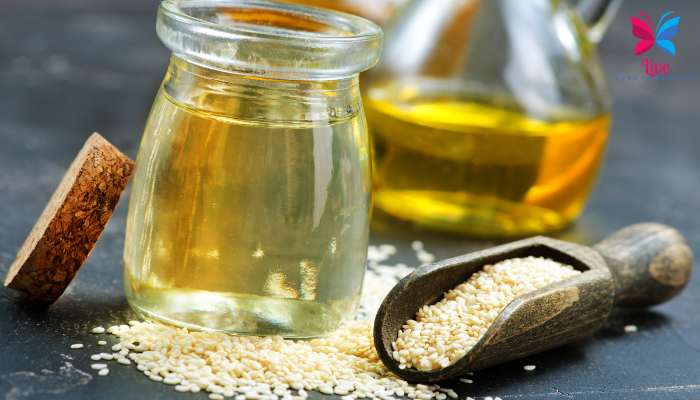Getting to Heart of Sesame Oil: Exploring IS Sesame Oil Bad For Health

Getting to Heart of Sesame Oil: Exploring Is Sesame Oil Bad For Health

Sesame Oil Bad For Health
Take a glance at any well-used bottle of sesame oil in the pantry, and it quickly becomes clear this versatile ingredient earns its place as a staple in many cuisines internationally. The rich, nutty oil pressed from tiny sesame seeds shines across global fare from stir fries to salad dressings, noodle bowls to baked goods and beyond. But is sesame oil’s full-bodied flavor a sign it’s equally heavy for healthy diets and lifestyles?
With conflicting nutrition reports questioning whether sesame oil detriments heart health or provides protective properties instead, getting to the bottom of this oil’s effects leads through a winding path of scientific research and cultural tradition. We’ll explore what modern studies reveal regarding sesame oil’s specific impacts across measures like cholesterol, inflammation, antioxidant status and more. Read on to uncover if sesame oil deserves a spot in a balanced, nourishing diet or if its substantiated drawbacks deem it an ingredient better left on grocery store shelves.
Sesame Oil Nutrition Facts and Smoke Points
While many vegetable oils like canola, sunflower and safflower oil come from seeds pressed directly into raw oil, sesame oil production goes one step further. The tiny sesame seeds are first toasted before pressing to impart richer flavor. The toasting process means sesame oil offers slightly different nutrition content and properties than other common cooking oils.
Here is an overview rundown of sesame oil’s basic nutritional attributes:
- Rich in healthy mono- and polyunsaturated fats, like heart-protective omega fatty acids
- High in fat-soluble vitamin E – an antioxidant and anti-inflammatory
- Decent vitamin K levels for blood coagulation
- Minimal vitamin A and fatty acid content from toasting
- No protein, carbs or other micronutrients
- High smoke point around 410°F makes it suitable for stir-frying and sautéing
So in terms of macronutrients, sesame oil consists almost entirely of unsaturated fats making it a stable cooking oil option. But some components like vitamin E and K do diminish slightly when the raw sesame seeds become toasted to produce sesame’s signature nutty, aromatic oil.
Now let’s dive deeper into what modern medical research says regarding sesame oil’s specific impacts across cardiovascular, inflammatory and general health markers…
Sesame Oil Effects on Heart Health and Cholesterol
Cardiovascular disease continues rising as a leading cause of mortality internationally. So understanding how dietary choices influence heart health and cholesterol levels is vital for evidence-based prevention. Because sesame oil derives almost fully from poly- and monounsaturated fats, it was initially viewed as universally ‘heart healthy’ for reducing LDL cholesterol when used instead of saturated fats.
However, newer large-scale studies found more complex effects at play. Some trials saw participants’ LDL cholesterol numbers improve over months with daily sesame oil use. But others noted elevated oxidized LDL levels, associated with plaque buildup in arteries. So it seems sesame oil’s high content of omega-6 polyunsaturated fats may trigger increasing oxidation while lowering absolute LDL values. This poses higher cardiac risk over time – similar to results seen with corn, soybean and cottonseed oils.
Researchers note though that real-world diets include many variables. So while heavy sesame oil use shows potential for harm, including moderate amounts within varied diets may strike an ideal balance. Using antioxidant-rich extra virgin olive oil as the primary cooking oil then adding small amounts of sesame oil for flavor may prove advantageous. Combining oils seems to mitigate any isolated drawbacks.
So is sesame oil bad for cholesterol? Not definitively. Incorporating minimally processed, unrefined sesame oil in moderation appears useful for improving blood lipid panels. But relying too heavily could eventually imbalance fatty acid ratios and edge cardiac risk markers the wrong direction. As with any singular change, maintaining dietary variety reduces chance of unintended effects emerging.
Impacts on Inflammation and Oxidative Stress
Chronic inflammation and excess oxidative free radical damage trigger most common health conditions over time, including cancer, diabetes, hypertension and cognitive decline. Dietary components play a pivotal role countering or contributing to systemic inflammation and antioxidant capacity. Since oxidative reactions also underlie cardiovascular disease processes, these two health aspects intrinsically relate.
Here too though, sesame oil’s effects flip between potentially decreasing and possibly increasing background inflammation and oxidative stress. Whole seeds and less processed sesame oils supply antioxidant vitamin E to combat free radicals. But omega-6 fatty acids are somewhat prone to rancidity and oxidation while cooking if not stored properly.
Research finds the antioxidant lignans unique to sesame seeds themselves offer immense anti-inflammatory potential. But refining methods to produce toasted sesame oil lower retained antioxidant content. So the level of processing proves paramount regarding where sesame oil’s attributes land on the spectrum of harming or helping systemic inflammation underlying chronic diseases. Less refined is best for health.
Additionally, overdoing omega-6 fatty acid intake compared to anti-inflammatory omega-3s found in oils like flax, walnut and fish, drives up inflammation. So ensuring dietary balance again proves vital to capitalize on potential perks of sesame oil without going overboard. Used as part of varied cooking fat sources, sesame oil enhances anti-inflammatory capacities without risk of worsened inflammation through disproportion.
Impact on Blood Pressure Readings
With heart health intricately linked to healthy blood pressure maintenance, sesame’s effects on hypertension rates also warrant attention. Here research draws an exceptionally positive picture. Clinical trials consistently demonstrate including at least a teaspoon of sesame oil daily measurably reduces blood pressure in as soon as two weeks.
In one study, patients with hypertension taking blood pressure medication capsules followed by swallowing a dose of unrefined sesame oil showed additive improvements without increasing medication. Another trial had participants with normal blood pressure incorporate sesame oil in cooking and as dressings over two months. Treatment groups saw average reduction of 8 blood pressure points compared to no change in controls.
Sesame oil’s heart healthy minerals like magnesium and calcium play a role by supporting healthy artery function for lowering hypertension risk. The exact mechanisms still need elucidating. But adding whole food sources of sesame or small doses of sesame oil clearly assist healthy blood pressure regulation for those with and without hypertension. This marks a reliable advantage against cardiac disease.
So is Sesame Oil Bad for Health? Depends How It’s Used
Taken together, evidence on whether or not sesame oil enhances or erodes wellness seems conflicting on first glance. But looking closer shows nuance at play. Howe sesame oil gets incorporated into overall eating patterns determines if benefits can shine brighter than potential pitfalls.
Here are tips for using sesame oil in ways to maximize advantages and avoid issues:
- Include small amounts for flavor layered with other healthy oils like olive and avocado rather than relying solely on sesame oil.
- Select unrefined, minimally processed sesame oils and use refrigerated to slow oxidation, retaining more antioxidants.
- Balance omega-6s from sesame oil with omega-3s from fatty fish, flaxseeds, walnuts etc.
- Monitor effects on cholesterol levels and inflammation markers at regular checkups.
- Add whole food sources of sesame like seeds and pastes instead of only oil form.
With conscientious use within varied diets, sesame oil enhances hearty, nourishing cuisine worldwide for good reason. Tracing back over 5,000 years to ancient China and the lens of Ayurvedic medicine, sesame oil provides grounding warming energy, lubricative moisture and protective antioxidants. Integrating toasted sesame oil into balanced diets and lifestyles can safely continue upholding traditional holistic health virtues.

Common Questions About Sesame Oil Health Effects
For further insight on navigating sesame oil’s impacts, here are answers to some frequently asked questions:
Does sesame oil raise cholesterol?
Evidence shows mixed effects on cholesterol levels. Relying too heavily on sesame oil could worsen LDL values or oxidation over years. But used in moderation among varied fats, small daily amounts appears useful for improving cholesterol.
Is toasted sesame oil healthy?
Yes, when used properly – plain, unrefined, toasted sesame oil offers protective factors like vitamin E and valuable omega fats. But take care not overheat oil when cooking to retain nutritional quality and slow rancidity.
What oil is the healthiest for cooking?
For high heat cooking, avocado and olive oil prove healthiest thanks to abundant monounsaturated fats and antioxidant capacities that remain relatively stable under heat. Each offers anti-inflammatory benefits reducing chronic disease risk.
Is it OK to cook with sesame oil?
Yes – sesame oil’s high 410°F smoke point withstands stir-frying, sautéing and baking without breaking down. Take care not to overheat oil to the smoking point as nutrients degrade and harmful compounds form.
Should sesame oil be avoided for high cholesterol?
Possibly – those with high cholesterol should minimize sources of omega-6 fats which may contribute toinflammation in excess. Substitute small sesame oil amounts with more monounsaturated olive oil instead.
Does sesame oil lower blood pressure?
Yes – human trials find consistent blood pressure improvements in hypertensive and normotensive adults adding modest one teaspoon sesame oil daily. Sesame provides heart-healthy minerals, fiber and antioxidant compounds lowering cardiac risk.
Is sesame high in omega-3?
No – sesame seeds and their derived oils are high in omega-6 polyunsaturated fats, but low in omega-3s. Balance sesame with fatty fish, flaxseed, walnuts and greens to meet both essential fatty acid needs.
Weighing Sesame’s Unique Health Effects
Echoing traditional medicine systems, current research shows properly balanced moderate sesame oil consumption marshals more positive effects than pitfalls for wellness. But overdoing any single food or nutrient proves inadvisable, tipping states of balance and homeostasis the body intrinsically strives to maintain.
So rather than wonder is sesame oil unhealthy, instead focus on incorporating minimally refined, toasted and flavored varieties judiciously as part of ethnically diverse cuisine. Then sesame oil can uphold its rightful place flavoring and fortifying dishes worldwide as it has for thousands of years. Drizzle rich, aromatic sesame over Asian noodles, use as a base for fusion dressings, or add a splash to dips and marinades. Just keep dietary diversity and moderation in mind as with any singular foodstuff.
Beyond adding depth and complexity to homemade dishes, versatile sesame oil brings satisfying hearty nutrition. An emblem of Ayurvedic and Traditional Chinese Medicine, sesame oil balances Vata and Kapha with its soft and lubricating warmth that calms nervous energy while enkindling digestive fire. Modern science confirms such protective antioxidant effects qualified through an Ayurvedic lens ages ago.
So sizzle up an antioxidant-rich stir fry with sesame oil or elevate a salad with its sheen. Just maintain balance and variety across the diet to prevent excess omega-6 intake. Then time-honored sesame oil uplifts overall wellbeing and culinary delight in tandem – proving its worth as true healing food.





Hi i think that i saw you visited my web site thus i came to Return the favore I am attempting to find things to improve my web siteI suppose its ok to use some of your ideas